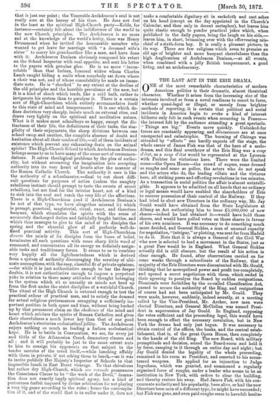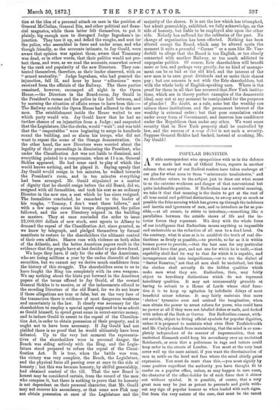THE LAST ACT IN THE ERIE DRAMA.
ONE of the most remarkable characteristics of modern American politics is their dramatic, almost theatrical character. Whether it arises from the increasing size of the interests involved or from a novel readiness to resort to force, whether quasi-legal or illegal, or merely from brighter methods of reporting, it is certain that political and social incidents in America begin to evoke a kind of interest hitherto only felt in such events when occurring in France— the interest felt by the audience attending a great spectacle. "Things are big." Events move quickly. Unlooked-for forces are constantly appearing. and denouements are at once unexpected and catastrophic. The burning of Chicago was
attended by " effects " one hardly expects off the stage, the whole career of James Fisk was that of the hero of a melo- drama, and this final overthrow of the Erie Ring was a coup Vtat, as a coup d'etat would be represented at the Lyceum with Fechter for victorious hero. There were the limited scene—the Opera House—the crowd of supers, some dressed as roughs and some as police, the actors who do not speak and the actors who do, the leading villain and the virtuous hero, all striking poses and effecting revolutions in ten minutes. As a transaction in social politics the affair is almost unintelli- gible. It appears to be admitted on all hands that no ordinary or legal means would have enabled the shareholders of Erie to recover possession of their control of the Railway. If they had tried to elect new Directors in the ordinary way, Mr. Jay Gould would have obtained from the State Legislature at Albany an Act authorizing him to issue £5,000,000 of new shares—indeed he had obtained it—would have held those shares, and would have polled votes on those shares in favour of his own nominees. It was necessary to do something much more decided, and General Sickles, a man of unusual capacity for negotiation, "intrigue," or plotting, was sent for from Madrid to do it. Note that it is always a General of the Civil War who now is selected to lead a movement in the Staten, just as a great Peer would be in England. What General Sickles actually did is still obscure, but the result of his action is clear enough. He found, after observations carried on for some weeks through a subordinate of the Railway, that a majority of the Erie Directors were discontented with Mr. Gould, thinking that he monopolized power and profit too completely, and opened a secret negotiation with them, which ended in their agreeing to paralyse the Board by sudden resignations. Dismissals were forbidden by the so-called Classification Act, passed to secure the authority of the Ring, and resignations of course had not been anticipated by Mr. Gould. They were made, however, suddenly, indeed secretly, at a meeting called by the Vice-President, Mr. Archer, new men were elected Directors, and General McClellan was named Presi- dent in supersession of Jay Gould. In England, supposing the votes sufficient and the proceeding legal, this would have been enough to effect the necessary revolution, but in New York the drama had only just begun. It was necessary to obtain control of the offices, the books, and the central estab- lishment, that is, of the great Opera House, then completely in the hands of the old Ring. The new Board, with military promptitude and decision, seized the Board-room and held it by force, camping in it through an entire day and night ; but Jay Gould denied the legality of the whole proceeding, remained in his room as President, and resorted to his accus- tomed weapons. He applied for an injunction to Judge Ingraham, which was granted, and summoned a regularly organised force of roughs, under a leader who seems to be an institution in New York, with orders to clear the building, and thereby restore his sway. Had James Fisk, with his con- summate audacityand his popularity, been alive, or had the new Directors been men of a different type, he might have succeeded; but Fisk was gone, and even paid roughs seem to have felt hesita-
tion at the idea of a personal attack on men in the position of General McClellan, General Dix, and other political and finan- cial magnates, while these latter felt themselves, to put it plainly, big enough men to disregard Judge Ingraham's in- junction. They tore it up, and defied the roughs, and sent for the police, who assembled in force and under arms, and who though friendly, as the accounts intimate, to Jay Gould, were aware that opinion was against them, aware that Tammany was dead, or in other words, that their politics would not pro- tect them, and were, as we read the accounts, somewhat cowed by the rank and popularity of the new Directors. They con- tented themselves, therefore, as their leader observed, with an " armed neutrality." Judge Ingraham, who had granted the injunction, fell ill, and hour by hour " adhesions " were received from the officials of the Railway. The three parties remained, however, encamped all night in the Opera House,—the Directors in the Board-room, Jay Gould in the President's rooms and the police in the hall between, and by morning the situation of affairs seems to have been this :— The Railway outside the Opera House had adhered to the new men. The establishment inside the House waited to see which party would win. Jay Gould knew that he had no further chance of an injunction from a Judge ; and suspected that the Legislature, like the clerks, would "wait"; and was told that the " respectables " were beginning to surge in hundreds round the building, and so alarm his troops, who did not want to repeat the scene of the Orange demonstration. On the other hand, the new Directors were worried about the legality of their proceedings in dismissing the President, who under the Classification Act was not liable to dismissal, and everything pointed to a compromise, when at 11 a.m. General Sickles appeared. He had some card to play of which the world knows nothing, and he played it. Saying openly that Jay Gould would resign in ten minutes, he walked towards the President's room, and in ten minutes everything had been arranged. Mr. Gould stipulated as a matter of dignity that he should resign before the old Board, did so, resigned with all formalities, and took his seat as an ordinary Director in the new one, a seat which he has since resigned. The formalities concluded, he remarked to the leader of his roughs, "Tommy, I don't want these fellows," and 'with a few savage curses his troops disappeared, the police followed, and the new Directory reigned in the building as masters. They at once rescinded the order to issue 22,000,000 dollars of new stock, sent agents to Albany to demand the repeal of the Classification Act, since granted, as we know by telegraph, and pledged themselves by formal manifesto to restore to the shareholders the ultimate control of their own affairs. Shares rose with violence on both sides of the Atlantic, and the better American papers exult in the evidence that the people have at last decided to put down fraud.
We hope they have, if only for the sake of the Americans, who are losing millions a year by the undue discredit of their securities, but we cannot say we derive much confidence from the history of this struggle. The shareholders seem to us to have fought the Ring too completely with its own weapons. We say nothing about the hints put forward in the American papers of the terms offered to Jay Gould, of the reward General Sickles is to receive, or of the inducements offered to the seceding Directors of the old Board, for we do not know if these allegations are true or false, but on the very face of the transaction there is evidence of most dangerous weakness and uncertainty in the law. It clearly was necessary for the shareholders to employ a special agent supposed to be as adroit as Gould himself, to spend great sums in secret-service money, and to induce Gould to assent to the repeal of the Classifica- tion Act, in order to obtain possession of their property, and it ought not to have been necessary. If Jay Gould had not yielded there is no proof that he would ultimately have been defeated. Up to the very last moment the representa- tives of the shareholders were in personal danger, the Bench was siding actively with the Ring, and the Legis- lature stood prepared to refuse the repeal of the Classi- fication Act. It is true, when the battle was won, the victory was very complete, the Bench, the Legislature, and the physical force all passing over at once to the side of honesty ; but this was because honesty, by skilful generalship, had obtained control of the till. That the new Board is honest may be considered certain, from the record of the men who compose it, bat there is nothing to prove that its honesty is not dependent on their personal character, that Mr. Gould may not recover his ascendancy, or that some new Fisk may not obtain possession at once of the Legislature and the
majority of the shares. It is not the law which has triumphed, but adroit generalship, exhibited, we fully acknowledge, on the side of honesty, but liable to be employed also upon the other side. Nobody has suffered for the robberies of the past. No change of organisation has been effected. Nothing has been altered except the Board, which may be altered again the moment it suits a powerful " Corner " or a man like Mr. Van- derbilt to allege that the Board is too English, or too closely connected with another Railway, or too much addicted to unpopular politics. Of course, Erie shareholders will benefit more or less, and perhaps very greatly, for no kind of manage- ment can be so bad as the old kind, and the interest of the new men is to earn great dividends and so make their shares pay ; but our concern is not with the Erie shareholders, but with the whole body of English-speaking men. Where is the proof for them in all that has occurred that New York institu- tions, which are in theory perfect examples of the democratic ideal, may not at any moment be manipulated for the purposes of plunder? No doubt, as a rule, none but the wealthy can misuse those institutions, and the permanent interest of the wealthy is external order ; but that poor consolation exists under every form of Government, and deserves less confidence under the Republican than under any other. We want some security that in New York property shall be controlled by law, and the success of a coup d'elat is not such a security. Suppose General Sickles had backed, instead of crushing, Mr. Jay Gould



































 Previous page
Previous page